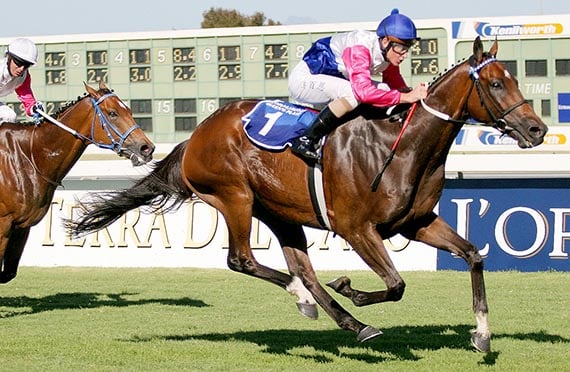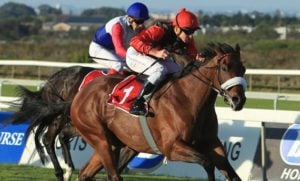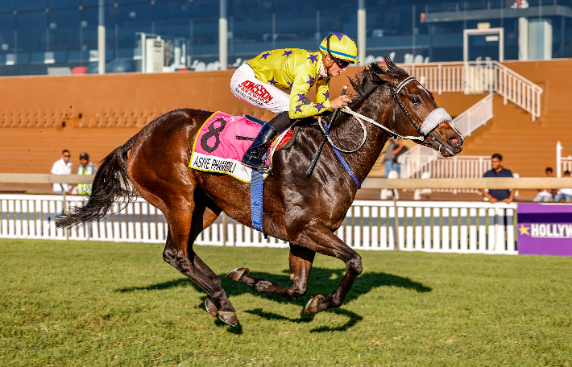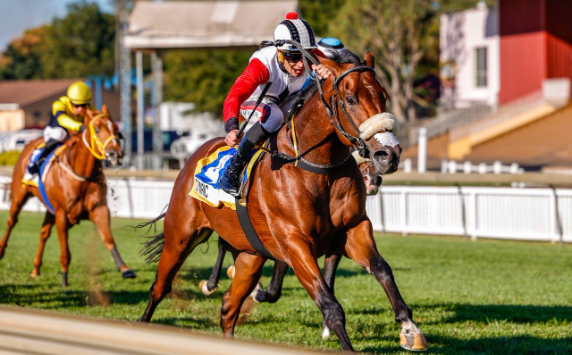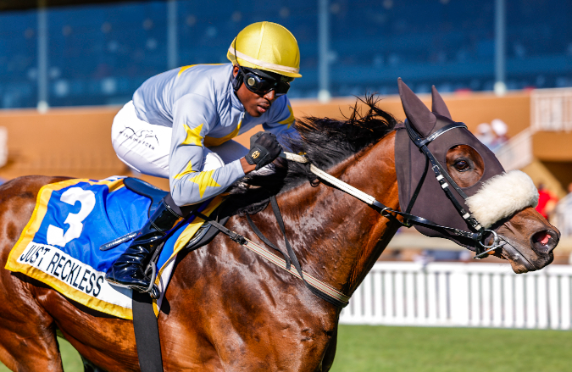The Cape Winter Series has stood the test of time. Since its inception in 1989, it has been a reliable indicator of future Gr1 greats, with its recent honour roll including horses such as Variety Club, Power King, Act Of War, Marinaresco and Whisky Baron.
Of course, if you look a little further back, names that jump off the page include Trademark, Tobe or Nottobe, Red Badge and Bunter Barlow, but whatever happens to the future of the Cape Winter Series, its place in our history is secure thanks to the mighty Pocket Power, the first, and to date only, horse to win the series and then go on to unimaginable glory, winning 4 Queen’s Plates, 3 Mets and the Durban July as well as being crowned Horse of the Year three times (2006/7, 2007/8 and 2008/9 seasons).
However, the first horse to come within a short head of immortality was Winter Solstice, who won two of the three legs of the series in 2004, going down a short head to his stablemate, Set To Music, in the 2004 Cape Winter Derby. Winter Solstice subsequently underlined his promise by going on to win two Queen’s Plates as well as being crowned Horse of the Year in 2004/05.
Another achievement worthy of a mention is that in 1998, the first year all three legs were held at Kenilworth, Mike Bass won all three legs, albeit with three different horses (Hard Knot, Roy G Biv and Great Memories).
But perhaps the most important fact, which is in danger of being lost in the sands of time, is that the Cape Winter Series was the brainchild of one-time Cape Racing Manager, Mike Wanklin. Mike has for some years been based in Singapore as their chief handicapper, and with the advent of our latest Cape Winter Series sponsor in Highlands, Part of Ridgemont, was kind enough to recount the story of how the race series came into being.
About Mike
Mike is probably best remembered as the enthusiastic long-striding young man from the Cape Turf Club with the generous mop of curly hair. Mike originally hails from Zimbabwe and started his racing career very young. “My mom had a job at Borrowdale Park and when I was 15, she got me a job selling tote tickets on race days for extra pocket money and it went from there really.” He started with a temp job with ‘the late, great Andrew Cameron’, the GM of Borrowdale at the time as well as Basil Thomas, who was the assistant General Manager. “In many ways Basil was a mentor to me. He was not hands on, but instilled into me morals and a love of the racing game. He was a good man. I’ve always had a lot of respect for Basil and Andrew Cameron. They were two men who were prepared to listen to young men with ideas and to give them a chance. I was very lucky in that respect. In the Western Cape, the guys like Eddie Price, Mike Louw, Vaughan Norton and Brian Beryl were similarly open minded and wanted me to express myself and give them ideas, which is something one doesn’t see happening so much nowadays,” he muses.
Cape Winter Series
Mike moved to the Western Cape in February 1988 and took up a job as assistant handicapper to Tarquin Norval at the Western Cape Racing Clubs. “In those days, the South African Turf Club and the Cape Turf Club were separate entities. Eddie Price was the GM and Mike Louw was the Assistant GM at the Cape Turf Club and at the SA Turf Club you had Vaughan Norton and Brian Beryl.”
“I was 25 at the time, very ambitious and exuberant – all those things that come with that age. I noticed that the programme in the Cape, more than any other centres in SA, was very orientated to juveniles in terms of novice plates, graduations and progress plates to allow horses to work through the ranks without having to face the handicapper. So I went to Brian Beryl and asked why there was nothing for the 3yos. In those days the top tier 2 and 3yo’s all went to Durban for the season and we’re talking ALL of them and for the duration of the season, not just a few or for selected races as you see now. So I said what about the horses just below the top tier – why don’t we put on something for them? I suggested that we offer similar prize money to a top division handicap, which was around R35k at the time and said it’s not a lot of money to create an incentive for some horses to stay back in the Cape if they might not have a good chance in Durban and will give them a nice opportunity to have a feature race series for themselves. Brian told me to write a paper, so I wrote a paper and gave it to him and he discussed it with both clubs. Both were very enthusiastic about it, so it was agreed and off we went.”
“There was even a trophy,” continues Mike. “The Cape Derby at one time was called the Jordache Derby and I found an old silver cup that had been presented for the Jordache Derby and asked the powers that be whether I could have it re-engraved for the Winter Challenge series and they allowed me to do that. I’d be interested to know if the trophy still exists,” he muses.
A Good Start
“The one thing with the Cape Winter Series is that it started at beginning of May after the rains had come, and the tracks had softened up after the summer season, so horses that were feeling the ground a bit were more prepared to hold back and race, particularly the Winter Guineas which has a phenomenal record of winners.”
The series was first run in 1989 when it comprised the 1600m Milnerton Mile, the 1800m Kenilworth Challenge and the 2000m Milnerton 2000. The series was split across the two centres and each of the races carried a stake of R30k with an additional bonus on offer to any horse that could win all three. “I was only the assistant handicapper at the time, so didn’t get the opportunity to name the races,” explains Mike. “It was only when I became the Racing Manager for Western Province racing 6 or 7 years later that I changed the names to the ones I’d originally wanted and got to call them the Winter Guineas, Classic and Derby.”
In the inaugural year of the series, the Milnerton Mile was run on 1 May 1989 and won by Mrs KA & HL Sarembock’s Rule The Roost (Hobnob – Caprice). Bred by Bosworth Farm, the bay gelding was trained by Derek Dalton and ridden to victory by Martin Uys. The Kenilworth Challenge, run on 17 June 1989 and the Milnerton 2000, run on 29 July 1989, were both won by Mr W J Engelbrecht’s Condorman (Condorcet – Boscastle) bred by S and S Stud, trained by Lenny Taylor and ridden by Mark Khan.
“The most interesting horse in that first series was Condorman,” remembers Mike. “He ran 5th in the Cape Derby, behind horses like Blue Cossack and Right Prerogative and I’d said to Lenny Taylor afterwards, ‘Geez, that was a good run!’ He replied, ‘Try and tell the owner, he’s disappointed we didn’t win.’ I said he’d been beaten by better horses on the day, but that it was still a great run. Of course he went on to win the Kenilworth Challenge and the Milnerton 2000 that season.”
The Test Of Time
While theories are all good and well, the proof of the pudding is always in the eating and the Winter Series results have stood the test of time. “I’ve always had a lot of joy following that series,” continues Mike. “Whilst not Gr1 class in the early stages, there were still some really nice horses prepared to stay back and run in the Winter Series – just look at horses like Molly Mandy, Glenconner, etc,” he reminisces and of course the results now speak for themselves. “The history and heritage of racing is so intrinsic to its future.”
Another of Mike’s legacies to Western Cape racing are the portraits of Met winners which still adorn Kenilworth Racecourse. “They were for the Metropolitan Room. I commissioned Charles Faull to do photographs of all the Met winners for that room. He made them look like paintings.” When I mention that a number of the brass plates have been removed from the pictures, leaving many of them nameless, he tuts sadly.
Moving On
At a conference in the late 90’s, Mike got chatting to the Senior Handicapper at Victoria Racing Club. He mentioned Singapore had just finished building Kranji and were looking for a handicapper and recommended Mike for the job. “They’d advertised the position for 3 or 4 months and not had any satisfactory responses, then I got a call out of the blue. At the time, I didn’t even know where Singapore was! I knew it was South East Asia, but wouldn’t have been able to point it out on a map. I got a call from them to ask if I was interested and I said sure. They flew me over for an interview and the rest is history.”
The series changed a little in Mike’s absence too. While the series was originally split across Milnerton and Kenilworth, since 1998 all three legs have been held at Kenilworth. The Derby distance was also adjusted from 2000m to the current 2400m in 1999.
Another Pocket?
Marinaresco, who campaigns in the same pink, white and blue silks as Pocket, looked to have the series in the bag last year, but his connections opted to skip the final leg and tilt at July glory instead. They very nearly got there too and have a second try at a July sash this year. However, 2017 is perhaps the best chance for a horse to share the Winter Series laurels with Pocket Power as African Night Sky takes his chances on 24 June. Being by Dynasty as well as being bred by new sponsors Highlands Stud – part of Ridgemont – he would make an appropriate winner, but they are very large shoes to fill.
Despite having been in Singapore all these years, Mike says, “My love for South African racing has never diminished, particularly racing in the Western Cape. I was privileged to be invited to the Sun Met earlier this year and it was wonderful to catch up with a great many racing folks.” Will he be watching the Winter Derby this weekend? “Yes – I have a Tellytrack account and always watch the big days when possible.”


